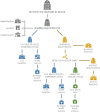Governance of community health worker programs in a decentralized health system: a qualitative study in the Philippines
- PMID: 33980209
- PMCID: PMC8114679
- DOI: 10.1186/s12913-021-06452-x
Governance of community health worker programs in a decentralized health system: a qualitative study in the Philippines
Abstract
Background: Community health worker (CHW) programs are an important resource in the implementation of universal health coverage (UHC) in many low- and middle-income countries (LMICs). However, in countries with decentralized health systems like the Philippines, the quality and effectiveness of CHW programs may differ across settings due to variations in resource allocation and local politics. In the context of health system decentralization and the push toward UHC in the Philippines, the objective of this study was to explore how the experiences of CHWs across different settings were shaped by the governance and administration of CHW programs.
Methods: We conducted 85 semi-structured interviews with CHWs (n = 74) and CHW administrators (n = 11) in six cities across two provinces (Negros Occidental and Negros Oriental) in the Philippines. Thematic analysis was used to analyze the qualitative data with specific attention to how the experiences of participants differed within and across geographic settings.
Results: Health system decentralization contributed to a number of variations across settings including differences in the quality of human resources and the amount of financial resources allocated to CHW programs. In addition, the quality and provider of CHW training differed across settings, with implications for the capacity of CHWs to address specific health needs in their community. Local politics influenced the governance of CHW programs, with CHWs often feeling pressure to align themselves politically with local leaders in order to maintain their employment.
Conclusions: The functioning of CHW programs can be challenged by health system decentralization through the uneven operationalization of national health priorities at the local level. Building capacity within local governments to adequately resource CHWs and CHW programs will enhance the potential of these programs to act as a bridge between the local health needs of communities and the public health system.
Keywords: Community health workers; Gender; Health systems; Local government; Philippines; Universal health coverage.
Conflict of interest statement
The authors declare that they have no competing interests.
Figures
Similar articles
-
Community health workers at the dawn of a new era: 9. CHWs' relationships with the health system and communities.Health Res Policy Syst. 2021 Oct 12;19(Suppl 3):116. doi: 10.1186/s12961-021-00756-4. Health Res Policy Syst. 2021. PMID: 34641902 Free PMC article. Review.
-
Successes and Lessons Learned From Implementing Community Health Worker Programs in Community-Based and Clinical Settings: Insights From the Gulf Coast.J Public Health Manag Pract. 2017 Nov/Dec;23 Suppl 6 Suppl, Gulf Region Health Outreach Program:S85-S93. doi: 10.1097/PHH.0000000000000653. J Public Health Manag Pract. 2017. PMID: 28961658
-
Community health worker models in South Africa: a qualitative study on policy implementation of the 2018/19 revised framework.Health Policy Plan. 2021 May 17;36(4):384-396. doi: 10.1093/heapol/czaa172. Health Policy Plan. 2021. PMID: 33367608 Free PMC article.
-
How does context influence performance of community health workers in low- and middle-income countries? Evidence from the literature.Health Res Policy Syst. 2015 Mar 7;13:13. doi: 10.1186/s12961-015-0001-3. Health Res Policy Syst. 2015. PMID: 25890229 Free PMC article.
-
Limits and opportunities to community health worker empowerment: A multi-country comparative study.Soc Sci Med. 2016 Sep;164:27-34. doi: 10.1016/j.socscimed.2016.07.019. Epub 2016 Jul 20. Soc Sci Med. 2016. PMID: 27459022
Cited by
-
Exploring the Role of Social Networks in Facilitating Health Service Access Among Low-Income Women in the Philippines: A Qualitative Study.Health Serv Insights. 2022 Jan 20;15:11786329211068916. doi: 10.1177/11786329211068916. eCollection 2022. Health Serv Insights. 2022. PMID: 35095277 Free PMC article.
-
Using the Socioecological Model to Explore Barriers to Health Care Provision in Underserved Communities in the Philippines: Qualitative Study.Asian Pac Isl Nurs J. 2023 Aug 22;7:e45669. doi: 10.2196/45669. Asian Pac Isl Nurs J. 2023. PMID: 37606966 Free PMC article.
-
Exploring the Use of Multiple Participatory Tools to Engage Community Health Workers in Program Evaluation and Implementation: A Case Study From the Philippines.Community Health Equity Res Policy. 2025 Jul;45(4):351-363. doi: 10.1177/2752535X241280353. Epub 2024 Sep 6. Community Health Equity Res Policy. 2025. PMID: 39241210 Free PMC article.
-
Amplifying Community Health Worker Voices to Examine the Implementation and Scaling of a Community Health Program: A Qualitative Study in the Philippines.Health Serv Insights. 2025 Jun 30;18:11786329251352658. doi: 10.1177/11786329251352658. eCollection 2025. Health Serv Insights. 2025. PMID: 40599892 Free PMC article.
-
The policy environment of self-care: a case study of the Philippines.Health Policy Plan. 2023 Feb 13;38(2):205-217. doi: 10.1093/heapol/czac095. Health Policy Plan. 2023. PMID: 36331518 Free PMC article.
References
-
- United Nations . The sustainable development goals. 2020.
-
- Gilmartin C. Management Sciences for Health. 2017. Community health workers: a Prioritiy for universal health coverage?
MeSH terms
LinkOut - more resources
Full Text Sources
Other Literature Sources



